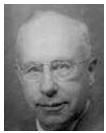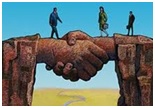|
 |
|
 |
|
|
||
Chester Barnard, The Functions of the Executive (1938) American business executive and expert on management (pictured right) He died in 1961.
See also... Chester Barnard in the Management Gurus section.
Book summary
The functions of an executive 1. Defining purpose An organization’s success depends on:
2. Co-operation Making sure:
All acts of the organization and its employees are “directly or indirectly interconnected and interdependent”.
3. Persuasion Inspiring excellent results by:
A manager’s authority doesn't depend on hierarchical position but on:
4. Moral action (integrity) Ensuring that managers’ (and their employees’) actions are based upon their personal morals. So managers must:
So leadership and management must:
5. Communication Effectively communicating the objectives of the organization and its employees
through:
People accept a manager’s communication when they:
6. Teamwork Managers must:
Key quote on management The inculcation of belief in the real existence of a common purpose is an essential executive function.
Key quote on leadership The endurance of organizations depends upon the quality of leadership and that quality derives from the breadth of the morality upon which it rests. |
|
|
||
|
|
||
| Copyright © wisdomtowin.com 2025 All Rights Reserved | ||
|









